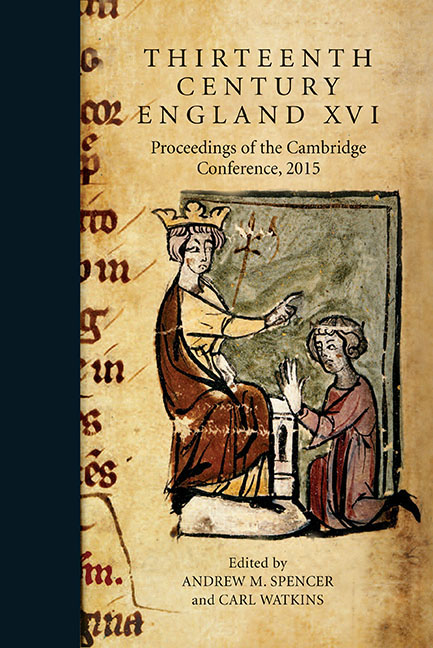Book contents
- Frontmatter
- CONTENTS
- List of Illustrations
- List of Contributors
- List of Abbreviations
- Introduction
- The Uncertainties of Reformers: Collective Anxieties and Strategic Discourses
- Moral Dilemmas in English Confessors’ Manuals
- Damnatio Eternae Mortis or Medicinalis Non Mortalis: The Ambiguities of Excommunication in Thirteenth-Century England
- The Contribution of Thomas Docking to the History of Political Thought
- Dealing with Inadequate Kingship: Uncertain Responses from Magna Carta to Deposition, 1199–1327
- The Rebel's Four Dilemmas in the Long Thirteenth Century
- The Daughters of William the Lion and Queen Ermengarde
- Simon de Montfort and the Ambiguity of Ethnicity in Thirteenth-Century Politics
- The Hue and Cry in Thirteenth-Century England
- Recalling Anglo-Scottish Relations in 1291: Historical Knowledge, Monastic Memory and the Edwardian Inquests
The Contribution of Thomas Docking to the History of Political Thought
Published online by Cambridge University Press: 23 August 2019
- Frontmatter
- CONTENTS
- List of Illustrations
- List of Contributors
- List of Abbreviations
- Introduction
- The Uncertainties of Reformers: Collective Anxieties and Strategic Discourses
- Moral Dilemmas in English Confessors’ Manuals
- Damnatio Eternae Mortis or Medicinalis Non Mortalis: The Ambiguities of Excommunication in Thirteenth-Century England
- The Contribution of Thomas Docking to the History of Political Thought
- Dealing with Inadequate Kingship: Uncertain Responses from Magna Carta to Deposition, 1199–1327
- The Rebel's Four Dilemmas in the Long Thirteenth Century
- The Daughters of William the Lion and Queen Ermengarde
- Simon de Montfort and the Ambiguity of Ethnicity in Thirteenth-Century Politics
- The Hue and Cry in Thirteenth-Century England
- Recalling Anglo-Scottish Relations in 1291: Historical Knowledge, Monastic Memory and the Edwardian Inquests
Summary
This paper stems from a project which aims at providing a general study of texts reflecting on power in England in a ‘long thirteenth century’. In particular, it examines the way commentators on Scripture considered themes such as political legitimacy and limits to temporal power, the kingdom and the idea of community, or the way power ought to be exercised. Although they probably expressed the majority view, the systematic questioning of Scripture led them to depart from available norms and discourses and progressively to construct new patterns of reference. In this context, the notion of uncertainty may help renew our understanding of political ideas in thirteenth-century England and in particular highlight the contribution of relatively neglected or lesser authors.
The life and works of Thomas Docking
Among these is Thomas Docking, a Franciscan of the Oxford convent. Thomas Docking, or Thomas Good, probably came from the village of Docking (Norfolk). He is mentioned for the first time in the correspondence of Adam Marsh, in a letter dated from 1251, in which Marsh asks the provincial minister, William of Nottingham, to assign to Thomas Docking the Bible that used to be in the possession of ‘P. of Worcester’, deceased. Marsh praises Docking for ‘his upright and most gracious life, the clarity and perspicacity of his intellect, his outstanding progress in learning, and his ready and eloquent speech’. At the beginning of the 1250s Docking may still have been a young brother; on the other hand the loan of a Bible was perhaps meant to facilitate his exegetical work. He is mentioned in later sources as a doctor in theology and became the seventh lector of the Oxford convent; he was probably active there in the mid 1260s, before moving to the convent of Norwich. But in 1269 he took part in the controversy between the Dominicans and the Franciscans in Oxford on the issue of the gifts made to the Franciscan convent. This is the last we hear about him and he may have died a short while later.
Docking established his reputation as an exegete. He is mentioned as the author of a biblical grammar and of commentaries on Job and on the Sentences, but these texts have not survived. The works that have come down to us are his commentaries on Isaiah, Deuteronomy, the Pauline epistles (incomplete) and Luke, as well as a quaestio on Job.
- Type
- Chapter
- Information
- Thirteenth Century England XVIProceedings of the Cambridge Conference, 2015, pp. 55 - 70Publisher: Boydell & BrewerPrint publication year: 2017

